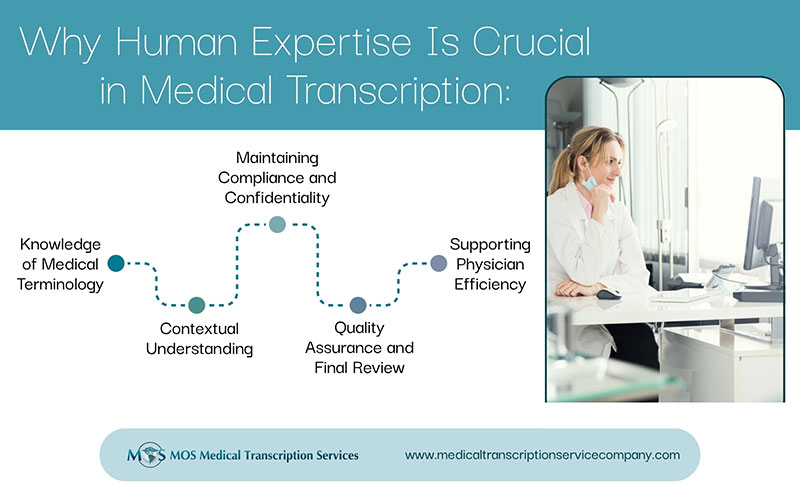
Proper staffing plays a key role in helping medical practices provide a safe work environment for healthcare personnel and for safe patient care. However, healthcare staffing shortages, an impact of the COVID-19 pandemic, continue to be a concern for practices. Hiring virtual assistants can fill the gap and help practices improve efficiency and workflow. For instance, medical transcription services are a practical option to document patient visits virtually and ensure accurate and timely electronic health records (EHRs). Today, practices are even using AI assistants for a range of other clerical tasks.
Reports: Staffing a Major Challenge for Medical Practices in 2022
A September 21 MGMA Stat poll found that staffing was the biggest pandemic challenge for 73% of medical practices as they headed into 2022. Up to 41% of respondents reported their staff turnover rates rose in the past quarter, compared to 33% who said it stayed the same and 26% who reported turnover recently slowed.
The American Medical Association (AMA) reported on statistics from the Kaiser Foundation and McKinsey & Co which showed how the pandemic had impacted the health care workforce:
- About one-third of doctors and nurses said they intend to reduce work hours in the next 12 months
- 62% said worry and stress from the pandemic has affected their mental health
- About 22% of nurses said they may leave their jobs in the coming year
- 69% of health care executives fear nursing shortages are worse than a year ago.
Medical practices have to find a way to deal with potential staffing shortages and have processes in place to ease these shortages and reduce inefficiencies. Getting virtual support can provide the solution by allowing practices to ease their daily administrative tasks and do more with fewer people in the office. Virtual medical transcription service providers can help physicians tame their EHRs and spend more quality time with their patients.
Role of a Virtual Medical Assistant
A dedicated virtual assistant can support medical practices in the following ways:
- Schedule patient appointments: With a virtual assistant, you no longer have to put your patients on hold when they call to book an appointment. Your virtual assistant is readily available to answer and return phone calls, transfer the call to the appropriate personnel if needed, help patients schedule online appointments, and provide you with easy access to patient appointments. Your virtual assistant will retrieve messages, and send confirmation emails and reminders.
- Inbox management: Every day, physicians need to manage a flood of mail, including incoming requests for medical records, lab orders, responding to individual text messages, online prescription refill requests, diagnostic reports, prescription refills, and other electronic communications. A virtual office assistant can tailor inbox management to meet the specific needs of individual physicians or practice groups and help them stay on top of these critical tasks.
- Insurance Eligibility/Prior Authorizations: Verifying patient eligibility ahead of the appointment is essential for accurate claim submission and reimbursement. A remote virtual assistant will access insurance portals and call insurance companies to confirm patient eligibility for tests, procedures, surgeries, and other treatments as well as obtain advance approval from a health plan before a specific patient service is delivered.
- Coordinating Referrals –Coordinating patient care for specialty referrals is a major task in primary care. Virtual assistance for this task involves setting up of referrals and communicating with consulting providers after appointments to get consultation and diagnostic reports, labs studies, and other records, and integrating them into the referring provider’s EMR.
- Responding to patient queries: To stay on track, patients need answers to their health-related queries. A virtual health assistant will respond to voice or text questions via mobile devices, social media, and emails. It will provide patients 24/7 access to current information, specific to their age and situation. With a virtual assistant, practices can increase patient engagement and enhance self-management skills for chronic disease.
- Helping patients navigate video visits: A new study found that a medical assistant can help patients participating in video visits through the technology and provide encouragement and a human connection. According to Kaiser Permanente research published April 11 in JAMA Internal Medicine, patients participating in video visits with their primary care doctors in fall 2020 benefited from having a medical assistant help connect the call, particularly if they needed language interpretation or lived in a low-socioeconomic-status neighborhood (https://www.eurekalert.org/news-releases).
- Maintaining and managing the patient database: When patient health information is buried in lengthy medical records, physicians find it difficult to absorb and access important data in a timely manner. Trying to find the information they need during the consultation can impact the time they have to actually speak with the patient. Hiring a virtual assistant can help physicians manage the patient database and retrieve the information they need easily.
Virtual assistance is also available for social media management, invoicing and billing, and medical charting or transcription. Natural Language Processing (NLP) and Machine Learning (ML) are speech recognition solutions that have revolutionized EHR documentation or transcription by reducing the need for typing. Today’s healthcare virtual assistant solutions allow physicians to interact easily with the EHR to schedule appointments, search charts, write orders, view lab results without touching their keyboard. Nevertheless, the human touch continues to be important when it comes to creating error-free EHR documentation.
Top Benefits of Virtual Support for a Medical Practice
- Increase face time with patients: Hiring a virtual medical assistant will reduce your workload, especially that related to documentation, which will give you more time to dedicate to patient care. By handling tasks such as documenting symptoms and medical history, a virtual assistant will allow you to save time, spend more time with each patient, and even see more patients.
- Cost-effective solution: With a virtual assistant, you save costs associated with hiring more office space or buying office equipment like computers and supplies. You only pay for the number of hours of remote virtual assistant support used. You also save on fixed salaries you would have to pay full-time staff, including health insurance and unemployment insurance. You get all the support you need with greater efficiency and no added expenses. In fact, hiring a well-trained remote office assistant is an ideal option for new practices with budget limitations.
- Improved service quality boosts patient experience: Having a virtual assistant to handle emails, phone calls, appointment scheduling and insurance verification, your staff would be free to focus on patients. This will improve the quality of services and increase patient satisfaction. Moreover, your remote office assistant would always be available to answer their questions, which will greatly improve the patient experience and your communication with them. You can provide more personalized services with a virtual medical office assistant.
- Round-the-clock support: If you run a busy medical practice, you can hire round-the-clock virtual support. Remote medical assistants are flexible in their working hours and can adjust their schedules to meet your requirements.
- Boost your online reputation: Specialized virtual medical assistants can also help manage your digital marketing campaign and social media presence. By managing your online marketing efforts, your remote assistant can boost your brand and your reputation.
- Improve productivity, efficiency and revenue: By saving time and creating workflows and processes that can boost physician and staff productivity, virtual office assistants can increase practice efficiency and revenue. With efficient insurance verification and preauth processes in place reduces risk of claim delays and denials.
- Reduce stress: According to Medscape’s Physician Burnout and Depression Report 2022, burnout has increased. While 42% of physicians reported that they are burned out in 2021, this year that proportion is 47%. Burnout among emergency physicians rose from 43% last year to 60% this year. Virtual medical office assistance plays a major role in reducing provider stress by taking care of burdensome tasks and freeing up physicians, allowing them to relax and improve work-life balance.
Seamless Support for Medical Charting
One of the areas where virtual assistance is thriving is medical transcription. With the support of a virtual medical transcriptionist, physicians can effectively manage important but time-consuming tasks such creating detailed patient reports, exam notes, discharge summaries and other documents. Medical transcription virtual assistants can provide EHR-integrated documentation solutions for various specialties including family practice transcription, pathology transcription HL7 transcription, discharge summary transcription, radiology transcription, emergency room transcription, and more.
To get the most of virtual medical office support, partner with an experienced service provider.


